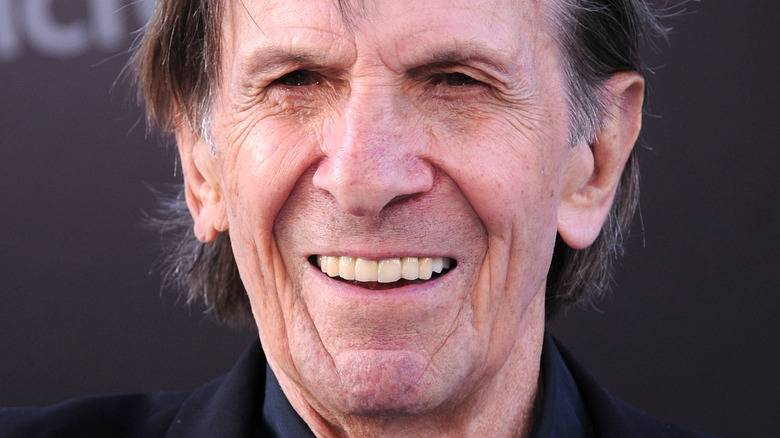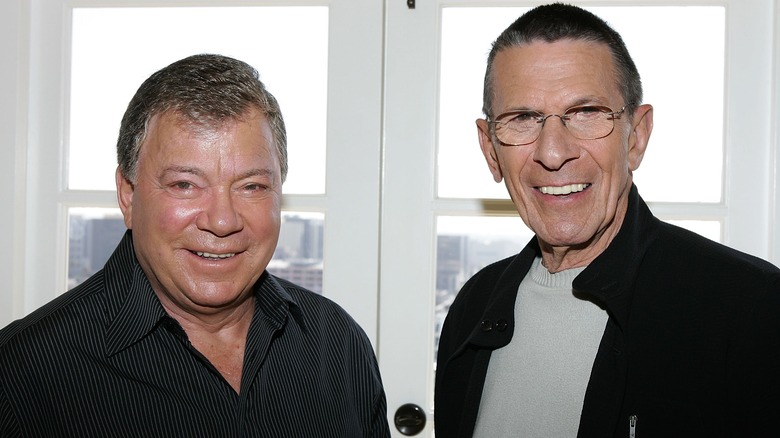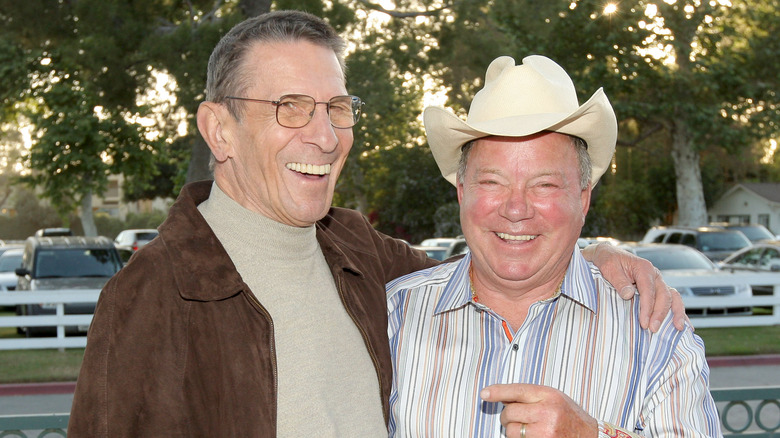Why Leonard Nimoy Stopped Talking To William Shatner
"Star Trek" is undoubtedly a cultural phenomenon, but it wasn't always that way. When the original series first aired on NBC in September 1966, viewers appeared to be less than impressed. Generating low ratings, the show was canceled after three seasons in 1969. The problem was not viewers, though, which became crystal clear the following decade. Per ScreenRant, the original series' low viewership was the consequence of a series of missteps by the network, including bad decisions regarding time slots. When syndicated reruns aired in the 1970s, "Star Trek" showed its true potential and became a hit, as The New York Times Magazine noted.
But even when "Star Trek: The Original Series" was on and garnering disappointing ratings, William Shatner was reportedly already acting like the big shot he would later become for portraying Captain James T. Kirk — and not in a good way. To varying degrees, Shatner's "Star Trek" co-stars have all decried his difficult on-set behavior. But it was the attention the late Leonard Nimoy's Spock and his Vulcan ears were getting that rattled Shatner the most, according to Express. Amid Shatner's jealousy, Nimoy accused his co-star of stealing his lines and hiding his bicycle.
Nimoy, however, denied there was actual bad blood between them. "Was there hatred? No. Sibling rivalry? Yes. We were like a pair of competitive brothers," he told the outlet. The rivalry turned into a friendship that seemed unshakable — until Nimoy stopped talking to Shatner for good.
Was Nimoy angry over Shatner's 'The Captains'?
William Shatner and Leonard Nimoy's relationship may have started on the wrong foot, but the two remained close for nearly their entire lives. When Nimoy died in February 2015, the two hadn't spoken in five years, Shatner revealed in his 2016 book, "Leonard" (via New York Post). The reason had nothing to do with their old rivalry but everything to do with their characters. At least that's what Shatner thinks.
When Nimoy refused to partake in Shatner's 2011 documentary "The Captains," Shatner filmed him without permission and featured him in it anyway, according to The Post. And that's why Shatner believes Nimoy cut ties with him. "It is something I will wonder about and regret forever," said Shatner in "Leonard" (via the Daily Mail). Shatner tried to reconcile with Nimoy by sending him a letter shortly before his death. "I have had a deep love for you Leonard — for your character, our morality, your sense of justice, your artistic bent," Shatner wrote. "You're the friend that I have known the longest and the deepest."
But his friend seemingly wanted to hear none of it and never responded. Shatner told The Guardian in May 2021 he is still unsure why Nimoy stopped talking to him. "He was my dearest friend. We talked about all kinds of things in the darkness of the limousine, about divorce and children. But something happened, I don't know what, it was so bizarre," he said.
Shatner considered Nimoy his 'only real friend'
William Shatner didn't have many true friends in life, explaining in his book, "Leonard," "Actors' friendships are like that. They tend to be deep and temporary." Leonard Nimoy, however, proved to be the exception to the rule. "Honestly until Leonard and I developed our relationship ... I never had a real friend; I didn't even know what a friend was," he added.
Nimoy was there for Shatner through thick and thin. Nimoy, who had previously had issues with alcohol, tried to help Shatner's third wife, Nerine Kidd, recover from her addiction by taking her to Alcoholic Anonymous, Shatner wrote in his 2008 memoir, "Up Till Now: The Autobiography" (via the Daily Mail). "Leonard Nimoy's personal experience of alcoholism ... helped us bond together in a way I never could have imagined in the early days of Star Trek," he wrote.
Nimoy even served as Shatner's best man at his wedding to Kidd, the Daily Mail reported. And although the two were estranged toward the end, Shatner believes Nimoy's affection for him for all those years was real. "His daughter told me not long ago: 'He really loved you.' And that moved me to tears," he told The Guardian in 2021.



